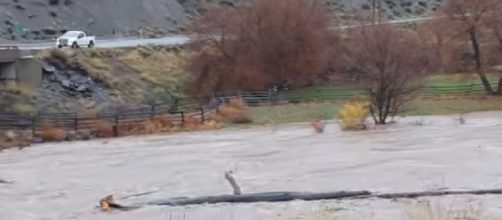Floods and landslides threw lives into disarray in the western province of British Columbia. It was the result of heavy rainfall that left people stranded in their vehicles on a highway. The landslide led to blockage of roads and reduced travel options. The authorities had to arrange aerial rescue by deploying helicopters. These conducted multiple missions to rescue nearly 275 people. They included children. The location of the vehicles was near a mountain located about 75 miles east of Vancouver. An important oil pipeline had to close down while flight schedules went haywire.
Reuters mentions the condition in Merritt. This city is 124 miles (200 kilometers) northeast of Vancouver. The authorities issued orders to its citizens to leave. The decision came after floods and rising water levels cut off bridges. As a result, the wastewater treatment plant had to close down. That meant the community would not be able to avail of sanitary services. These would translate into issues related to public hygiene.
Floods affected the transfer of crude oil to the Pacific Coast
Before the present climatic disturbances that brought landslides and floods, Canada had to tackle an out-of-control wildfire. It destroyed an entire town. Now, the floods and landslides have applied brakes on crude oil transfer from Alberta to the Pacific Coast.
The Trans Mountain pipeline has a capacity of 300,000 barrels per day. Reuters goes on to add that some areas received 8 inches of rain on Sunday. It was the equivalent of a month's rainfall. The condition of the roads was not suitable for smooth flow of traffic.
Road washed away by the floods
The floods washed away parts of a road near the town of Hope.
Reuters quotes a minister saying: "The situation is dynamic ... it is very difficult weather." He is Mike Farnworth, provincial public safety minister, and he made these comments to a section of the media. This storm is the second weather-related calamity to hit Canada within a few months. Earlier, in late June, high temperatures led to fires that destroyed one town.
Officials have cautioned about possible power outages in case gales strike the area. These can leave the infrastructure in shambles, and recovery would be a long-drawn process with financial implications. During climatic disturbances, power outages are normal for various reasons, like uprooting poles or damages to the supply network. In such cases, renewable energy can save the day. With the frequency of heatwaves, floods, and other similar incidents rising, people have to be ready with alternatives.
Heavy rains, mudslides, and floods had an impact on the highways
According to Al Jazeera, heavy rainstorms lashed the western Canadian province of British Columbia. It triggered landslides that led to the closure of roads and the evacuation of an entire town.
In the town of Meritt, the rising level of the water isolated the bridges, and the wastewater treatment plant stopped functioning. The city administration explained: "Continued habitation of the community without sanitary services presents a risk of mass sewage back-up and personal health risk."


